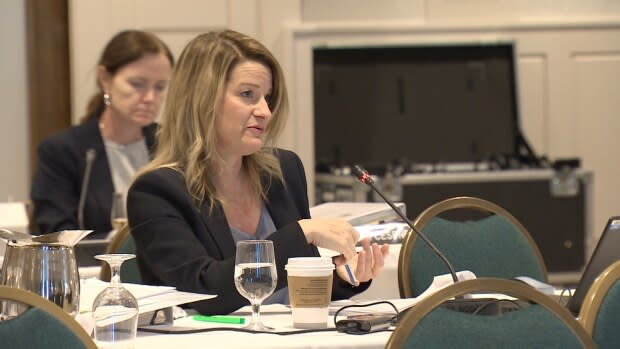NB Power's smart meter plan gets major boost with critical endorsements
Two key players who helped sink NB Power's application for smart meters two years ago told the Energy and Utilities Board they are satisfied the utility has sufficiently improved its proposal and individually offered critical endorsements of the new plan.
"Our own assessment is that even when tested, the business case advanced remains positive," said J.D. Irving Ltd. lawyer Christopher Stewart about NB Power's $92-million application to buy and deploy advanced metering infrastructure (AMI), including 360,000 smart meters.
JDI and public intervener Heather Black both opposed a similar NB Power application two years ago and were each cited in the EUB's 2018 decision that rejected the project.
But during closing arguments Wednesday wrapping up eight days of hearings into a renewed application, each said the utility had improved the quality of its proposal enough to warrant approval.

"Our criticisms in the last AMI proceeding were primarily centred on our view that the business case lacked detail on the primary benefits and lacked independent expert validation," said Stewart. "NB Power has sufficiently addressed these perceived deficiencies in this application."
Black agreed and she was satisfied by the entirety of the evidence and expert testimony that supported it.
"NB Power has proven that it has a positive business case," Black said. "In any scenario that the evidence can bear, the business case is positive."
NB Power's case for smart meters
NB Power considers the adoption of smart meters and the technology that supports them to be critical to its future and during the last two weeks put effort into presenting more convincing evidence for that position than it did in 2018.
The utility built a business case that showed the investment would make, not lose, money and it hired a string of experts to independently test its plans.
In a 94-minute closing address to the Energy and Utilities Board, NB Power lawyer John Furey methodically recapped the costs and benefits detailed in the business case supporting the AMI investment and tried to assure board members the utility would make the project work.

"It is in the best interest of NB Power, its customers and all stakeholders that the deployment of AMI is a success and that costs are contained within approved budgets and all benefits are achieved."
Smart meters are capable of two-way communication with the utility, allowing them to be read remotely several times an hour rather than in person and manually once a month.
NB Power says that will generate 16 separate financial benefits in the short term that will more than pay for the $92 million upfront investment.
More importantly, it argues the meters will open up a variety of future innovations in pricing and service not possible without the technology, including time-varying rates where electricity can be priced at different amounts during different times of the day.
Budgets scrutinized
During hearings, various interveners tested NB Power's budgets and projections for the project and although some weaknesses were found, none were large enough to kill the project a second time, according to Stewart.
"Broadly speaking, the quantified benefits asserted are within the realm of reasonableness and sufficiently supported by independent evidence," said Stewart. "Costs are generally supported within a reasonable level of specificity and also supported by acceptable evidentiary foundation.
"The interveners and the utility might debate whether the precise quantification of a particular benefit should be x or y or whether an assumption is conservative as opposed to merely reasonable, but frankly that's the natural consequence of a proposal of this type."
Endorsements were not unanimous. Individual interveners Gerald Bourque and Roger Richard each urged the EUB to reject the meters as unsafe.
Bourque said he considers the devices to be a fire hazard based on problems experienced in Saskatchewan several years ago.
Richard expressed concern about the long-term health effects of radio frequencies constantly emitted by the meters as they communicate data back to NB Power.
The utility has said consumers concerned about smart meters can refuse to accept them but will be billed for having their meters read manually at a cost estimated to be $4 per month.
A decision from the EUB on the application is not expected for several weeks.


